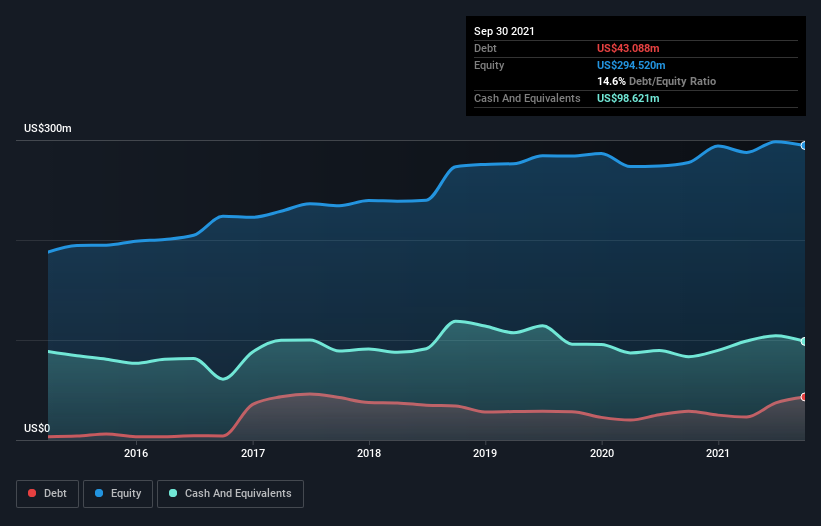Magic Software Enterprises (NASDAQ:MGIC) Has A Rock Solid Balance Sheet
The external fund manager backed by Berkshire Hathaway's Charlie Munger, Li Lu, makes no bones about it when he says 'The biggest investment risk is not the volatility of prices, but whether you will suffer a permanent loss of capital.' When we think about how risky a company is, we always like to look at its use of debt, since debt overload can lead to ruin. We can see that Magic Software Enterprises Ltd. (NASDAQ:MGIC) does use debt in its business. But the real question is whether this debt is making the company risky.
Why Does Debt Bring Risk?
Generally speaking, debt only becomes a real problem when a company can't easily pay it off, either by raising capital or with its own cash flow. In the worst case scenario, a company can go bankrupt if it cannot pay its creditors. While that is not too common, we often do see indebted companies permanently diluting shareholders because lenders force them to raise capital at a distressed price. Of course, the upside of debt is that it often represents cheap capital, especially when it replaces dilution in a company with the ability to reinvest at high rates of return. When we think about a company's use of debt, we first look at cash and debt together.
Check out our latest analysis for Magic Software Enterprises
What Is Magic Software Enterprises's Net Debt?
The image below, which you can click on for greater detail, shows that at September 2021 Magic Software Enterprises had debt of US$43.1m, up from US$28.8m in one year. But on the other hand it also has US$98.6m in cash, leading to a US$55.5m net cash position.
A Look At Magic Software Enterprises' Liabilities
We can see from the most recent balance sheet that Magic Software Enterprises had liabilities of US$95.6m falling due within a year, and liabilities of US$80.9m due beyond that. Offsetting this, it had US$98.6m in cash and US$134.2m in receivables that were due within 12 months. So it can boast US$56.3m more liquid assets than total liabilities.
This surplus suggests that Magic Software Enterprises has a conservative balance sheet, and could probably eliminate its debt without much difficulty. Succinctly put, Magic Software Enterprises boasts net cash, so it's fair to say it does not have a heavy debt load!
Also positive, Magic Software Enterprises grew its EBIT by 28% in the last year, and that should make it easier to pay down debt, going forward. There's no doubt that we learn most about debt from the balance sheet. But it is future earnings, more than anything, that will determine Magic Software Enterprises's ability to maintain a healthy balance sheet going forward. So if you're focused on the future you can check out this free report showing analyst profit forecasts.
Finally, a company can only pay off debt with cold hard cash, not accounting profits. While Magic Software Enterprises has net cash on its balance sheet, it's still worth taking a look at its ability to convert earnings before interest and tax (EBIT) to free cash flow, to help us understand how quickly it is building (or eroding) that cash balance. Over the last three years, Magic Software Enterprises recorded free cash flow worth a fulsome 100% of its EBIT, which is stronger than we'd usually expect. That positions it well to pay down debt if desirable to do so.
Summing up
While it is always sensible to investigate a company's debt, in this case Magic Software Enterprises has US$55.5m in net cash and a decent-looking balance sheet. And it impressed us with free cash flow of US$41m, being 100% of its EBIT. So is Magic Software Enterprises's debt a risk? It doesn't seem so to us. There's no doubt that we learn most about debt from the balance sheet. But ultimately, every company can contain risks that exist outside of the balance sheet. For example - Magic Software Enterprises has 2 warning signs we think you should be aware of.
If, after all that, you're more interested in a fast growing company with a rock-solid balance sheet, then check out our list of net cash growth stocks without delay.
Have feedback on this article? Concerned about the content? Get in touch with us directly. Alternatively, email editorial-team (at) simplywallst.com.
This article by Simply Wall St is general in nature. We provide commentary based on historical data and analyst forecasts only using an unbiased methodology and our articles are not intended to be financial advice. It does not constitute a recommendation to buy or sell any stock, and does not take account of your objectives, or your financial situation. We aim to bring you long-term focused analysis driven by fundamental data. Note that our analysis may not factor in the latest price-sensitive company announcements or qualitative material. Simply Wall St has no position in any stocks mentioned.

 Yahoo Finance
Yahoo Finance 
